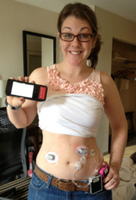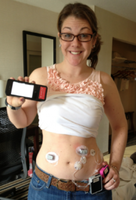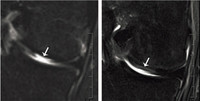Accurate disease diagnosis, patient stratification and biomarker validation require the analysis of multiple biomarkers. This paper describes cross-reactivity-free multiplexing of enzyme-linked immunosorbent assays (ELISAs) using aqueous two-phase systems (ATPSs) to confine detection antibodies at specific locations in fully aqueous environments. Antibody cross-reactions are eliminated because the detection antibody solutions are co-localized only to corresponding surface-immobilized capture antibody spots. This multiplexing technique is validated using plasma samples from allogeneic bone marrow recipients. Patients with acute graft versus host disease (GVHD), a common and serious condition associated with allogeneic bone marrow transplantation, display higher mean concentrations for four multiplexed biomarkers (HGF, elafin, ST2 and TNFR1) relative to healthy donors and transplant patients without GVHD. The antibody co-localization capability of this technology is particularly useful when using inherently cross-reactive reagents such as polyclonal antibodies, although monoclonal antibody cross-reactivity can also be reduced. Because ATPS-ELISA adapts readily available antibody reagents, plate materials and detection instruments, it should be easily transferable into other research and clinical settings.
Author: Eagle Biosciences
A brand new device, a blood cleansing
machine developed by bioengineers at Harvard’s Wyss Institute has proven to be
effective in clearing the bloodstream of deadly pathogens.The device, also known as the “artificial spleen”
works by running whole blood through a single bio-spleen unit in vitro. It
utilizes protein-coated nanobeads and magnets to bind to sugar molecules on the
surfaces of over 90 different pathogens including bacteria, viruses and
fungi. Read more
This is fascinating research as this device may prove to
fulfill the insurmountable need of combating antibiotic resistant
pathogens. Ebola, watch out…with
continued progress in this research your days may be numbered! Read more
image from new.softpedia.com

September 16, 2014: Eagle Biosciences recently announced a North American distribution agreement with ImmuSmol, Inc. of France. ImmuSmol develops and manufactures research antibodies and esoteric assays in a variety of research fields. They strive to be the best in the industry by selecting antibodies for their specificity and binding affinity by ELISA and systematically validating for IHC.They have a strong expertise in antigen design and a solid focus for targeting low molecular weight molecules which are not typically addressed by antibodies such as amino acid metabolites, lipids, saccharides, toxins, pesticide residues, and small molecule drugs.
“ImmuSmol products bring tremendous value to EagleBio and more specifically our line of antibodies.” said Dan Keefe President of EagleBio. He continued, “A partnership with ImmuSmol provides us with not only robust, high quality antibodies, but it also links EagleBio to a niche market for the detection of small molecules in cells, tissues, and biological fluids.” Keefe added, “There are so many small molecules that could serve as potential drug targets but have yet to be studied in this way. We certainly plan to stay abreast of the developments in the ImmuSmol pipeline and continue to offer new products in emerging areas of research.”
These products are currently for research use only. Check out the list of new ImmuSmol antibodies below, visit the Eagle website www.EagleBio.com, or call 866-411-8023 for full details.
L-Tryptophan mouse Monoclonal Antibody
L-Kynurenine mouse Monoclonal Antibody
L-Kynurenine rabbit Polyclonal Antibody
Kynurenic acid mouse Monoclonal Antibody
Kynurenic acid rabbit Polyclonal Antibody
Quinaldic acid mouse Monoclonal Antibody
Quinaldic acid rabbit Polyclonal Antibody
Anthranilic acid mouse Monoclonal Antibody
Anthranilic acid rabbit Polyclonal Antibody
3-HydroxyAnthranilic acid mouse Monoclonal Antibody
3-HydroxyAnthranilic acid rabbit Polyclonal Antibody
Quinolinic acid mouse Monoclonal Antibody
Quinolinic acid rabbit Polyclonal Antibody
Picolinic acid rabbit Polyclonal Antibody
Cinnabarinic acid mouse Monoclonal Antibody
Xanthurenic acid mouse Monoclonal Antibody
Xanthurenic acid rabbit Polyclonal Antibody
Dopamine rabbit Polyclonal Antibody
3-Methoxytyramine rabbit Polyclonal Antibody
GABA rabbit Polyclonal Antibody
Serotonin rabbit Polyclonal Antibody
Melatonin rabbit Polyclonal Antibody
5-HIAA rabbit Polyclonal Antibody
L-Glutamate rabbit Polyclonal Antibody
L-Glutamate mouse Monoclonal Antibody
D-Serine rabbit Polyclonal Antibody
L-Serine rabbit Polyclonal Antibody
The utility of circulating LHCGR as a predictor of Down’s syndrome in early pregnancy
Abstract
Background
Previous studies showed that soluble LHCGR/hCG-sLHCGR concentrations in serum or plasma combined with PAPP-A and free βhCG significantly increased the sensitivity of Down’s syndrome screen at early pregnancy without altering the false positive rate. The goal of the present study was to further examine the role of sLHCGR forms as combinatorial markers and to investigate whether sLHCGR could serve as an independent biomarker for Down’s syndrome in first trimester pregnancy screens.
Methods
The PAPP-A, free βhCG, and hCG-sLHCGR concentrations together with nuchal translucency (NT) were measured in 40 Down’s and 300 control pregnancies. The sLHCGR concentration was analysed in 40 Down’s and 206 control pregnancies.
Results
The hCG-LHCGR in combination with PAPP-A and free βhCG increased the detection rate (DR) by 35% without altering the false positive rate (FPR). The sLHCGR: hCG-sLHCGR ratio alone detected 80% of Down’s pregnancies in first trimester screening, with a false positive rate of 0.5%.
Conclusions
While measurement of sLHCGR forms in combination with PAPP-A and free βhCG significantly increases the detection rate of Down’s syndrome at first trimester, the ratio of sLHCGR: hCG-sLHCGR acts as an independent marker with a detection rate that is significantly higher than the existing biochemical markers individually for prenatal first trimester screening of Down’s syndrome.
Keywords:
hCG Receptor; sLHCGR; hCG-LHCGR; ELISA; Down’s syndrome; Prenatal diagnosis; Screening test; Noninvasive prenatal test (NIPT); Early pregnancy
See full details at BioMed Central:
https://www.biomedcentral.com/1471-2393/14/197


Chromogranin ELISA CHR31-K01
Expiring (10/31/14)
Osteocalcin ELISA OST31-K01
Expiring (11/30/14)
Vitamin B2 HPLC Assay VB231-H100
Expiring (11/22/14)

The bionic pancreas is just what it sounds like, a potential superhero for diabetics! It is a prototype device that has been designed to reduce the constant
burden of monitoring and adjusting blood sugar levels for the millions of
people with this disease. These trials so far have demonstrated its ability to not
only reduce the average blood sugar and reduce the risk of low blood sugar but
also to calculate the number of carbohydrates the diabetic is eating and
automatically give insulin as needed. The
current model consists of three parts but will eventually be manufactured as a
single unit. Read more
This
product is still in the testing and trial phases but so far it has generated a
lot of attention in the scientific community and hope for these individuals and
their families. Read more
All of us have family, friends, or people we know who have
this disease. In fact, according to the CDC over 9% of the population in the
United States has diabetes. Could it really be possible for one device
to make such a difference? After learning a little bit about this device,
we decided to find out what a couple of the diabetics in our lives
thought. One of these individuals
commented, “This is phenomenal, the ability to improve my health and lifestyle
with one device is just amazing.” However, this excitement also comes with some concerns like “will
insurance cover it and if not, then only a select few could afford it.” Another
individual stated, “I absolutely want one of these. Not having to count my carbs, prick my
finger, or carry multiple devices…would make my life so much easier.”
Now let us know what you think.
Related articles:
Bionic Pancreas’ Helps Control Blood Sugar in Type 1 Diabetes
Outpatient Glycemic Control with a Bionic Pancreas in Type 1 Diabetes
Bionic Pancreas Outperforms in Adults, Youth

Image above from www.viralglobalnews.com
Everyone out there who contributed to supporting the ALS
Foundation should be patting themselves on the back. The awareness that you
created and the funding that you have provided the organization has led to $109.1
million in Ice Bucket Challenge donations! And this article is evidence of the
difference that these donations will continue to make towards working to
a cure. Examining the roles of two genes in a two separate cohorts of fruit
flies has led to interesting findings that may eventually help researchers
determine how to intervene. Read more
Nashua, NH: Eagle Biosciences announces the
product launch of a handful of robust kits including Free Beta HCG ELISA, PAPP-A ELISA, Calcitonin ELISA, Renin ELISA, and Troponin I ELISA. These assays were developed by Diametra in
Italy (www.diametra.com) and will be great additions to our steroid hormone,
bone metabolism, and oxidative stress lines respectively. Diametra develops and manufactures innovative
products in target diagnostic segments such as autoimmune diseases, fertility,
and a wide variety of other research areas. They pride themselves on the quality of their products and providing top-notch
service thus aligning well with Eagle Biosciences’ goals and philosophies.
Free Beta HCG ELISA and the PAPP-A ELISA are very
sensitive and specific assays that provide quick results within a couple of
hours. These analytes provide tremendous value to pregnancy and fertility
research as a whole in terms of predicting abnormal pregnancy/disease states. The
third product launched is the Calcitonin ELISA which utilizes simultaneous capture
of an antigen by two monoclonal antibodies that provide the kit with excellent
specificity with no interferences from other hormones.Calcitonin is useful in several research
areas and has particular importance in research/diagnosis of medullary thyroid
cancer and the study of the pathophysiology of calcium and bone metabolism. Renin ELISA and Troponin ELISA, the last two
kits in the new cohort of products from Diametra offer a wide dynamic range and
excellent sensitivity.Together they
will provide accurate and valuable results to researchers studying hypertension
and myocardial damage respectively.
“It is always our goal to provide quality
products that meet researchers’ needs and these products from Diametra do just
that.” said Dan Keefe, President of EagleBio. He continued, “These assays all serve a unique purpose in a variety of
emerging areas of research and they certainly will complement their respective
product lines well.”
Eagle will be offering promotional pricing for
the Free Beta HCG ELISA, PAPP-A ELISA, Calcitonin ELISA, Renin ELISA, and
Troponin ELISA within the next few months. These products are currently for
research use only. Check out the Eagle website www.EagleBio.com or call
866-411-8023 for full details.


With over 100 publications to date, the ADMA ELISA Assay kit offered by DLD Diagnostika and Eagle Biosciences has demonstrated that it is the clear gold standard assay for measuring ADMA. Check out the product pages for full information, or find the link below to the complete listing:
- ADMA ELISA Assay Kit
- ADMA Ultrasensitive ELISA Assay Kit
- Mouse / Rat ADMA ELISA Assay Kit
For a Full Listing of Publications utilizing these ADMA ELISA Assay kits, click on the link below:
ADMA ELISA Assay Kit Publications


Millions of
people suffer from osteoarthritis and/or joint disease.These diseases are caused by the loss of
articular cartilage within your joints which serve the purpose of providing
cushioning at the end of your bones.The
most common treatments for this are painful injections and joint replacements.
But recent research involving treating
cartilage defects with nasal septum cells may bring hope to these patients.
Perhaps many of you out there are wondering…cells from nose to knee…what?! What
will they come up with next!? Read more

